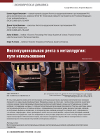Institutional Rent in Metallurgy: Ways of Use
DOI: https://doi.org/10.33917/es-6.180.2021.68-75
The article describes the possible use of institutional rent of the largest metallurgical companies associated with their non-market advantages. The author identifies the channels for obtaining such rent, including differences in the tax burden, difference in the rates of involved financial resources for companies operating in different institutional conditions, state support and benefits from peculiarities of the vertical organization of production. Some estimates of institutional rent are obtained and questions are raised about the income and expenses level, fair for the economy, of the companies that receive it. The directions, in which large companies spend the received rent, are highlighted; it is emphasized that withdrawal of “windfall revenues” can be made only after they are compared with non-market expenses of companies, imputed by the state. At the same time, information on such costs is scattered, inaccurate and therefore requires serious assessment and monitoring. The author substantiates an approach wherein the state and big business are interested to seek a mutually beneficial use of the received institutional rent.
Источники:
1. Blokhin A.A. Institutsional’naya renta v mnogourovnevoi ekonomike [Institutional Rent in a Multilevel Economy]. Problemy prognozirovaniya, 2019, no 4, pp. 16–26.
2. Blokhin A.A., Lomakin-Rumyantsev I.V., Naumov S.A. Al’fa-biznes na rossiiskom prodovol’stvennom rynke [Alfa-Business in the Russian Food Market]. Ekonomicheskie strategii, 2019, no 6, pp. 68–77, available at: DOI: https://doi.org/10.33917/es-6.164.2019.68-77.
3. Blokhin A.A., Dranev S.Ya. Razlichiya institutsional’nykh uslovii deyatel’nosti kompanii raznogo razmera na primere chernoi metallurgii [Differences in the Institutional Environment for Companies of Different Sizes by the Case of Ferrous Metallurgy]. Mir novoi ekonomiki, 2019, no 1, pp. 36–47, available at: DOI: https://doi.org/10.26794/2220-6469-2019-13-1-36-47.
4. Prikaz FNS Rossii ot 30 maya 2007 g. N MM-3-06/333@ (v red. ot 10 maya 2012 g.) “Ob utverzhdenii Kontseptsii sistemy planirovaniya vyezdnykh nalogovykh proverok” [Order of the Federal Tax Service of Russia Dated May 30, 2007 No. MM-3-06/333@ (as Amended on May 10, 2012) “On Approval of the Concept of the Planning System for Field Tax Audits”]. Konsul’tantPlyus, available at: http://www.consultant.ru/document/cons_doc_LAW_55729/fcaa26fb2b72a7ef1b1bdb6904804f9a2a7d2d3c/
5. Informatsiya Federal’noi nalogovoi sluzhby ot 23 maya 2019 g. “Sredneotraslevye pokazateli, kharakterizuyushchie finansovo-khozyaistvennuyu deyatel’nost’ nalogoplatel’shchikov za 2018 god” [Information from the Federal Tax Service of May 23, 2019 “Average Industry Indicators Characterizing Financial and Economic Activities of Taxpayers in 2018”]. Garant.ru, available at: https://www.garant.ru/products/ipo/prime/doc/72147454/
6. Finansovoe zdorov’e stal’noi otrasli 2020. Analiz finansovykh pokazatelei publichnykh kompanii — proizvoditelei stali [Financial Health of the Steel Industry 2020. Financial Performance Analysis of Public Companies — Steel Producers]. Kiev, OOO “GMK Tsentr’, 2020.



